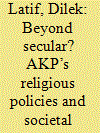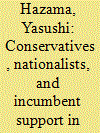|
|
|
Sort Order |
|
|
|
Items / Page
|
|
|
|
|
|
|
| Srl | Item |
| 1 |
ID:
181649


|
|
|
|
|
| Summary/Abstract |
This article addresses the religious policies of Turkey’s Justice and Development Party (AKP) targeted at promoting Islam among the Turkish Cypriot community. For the secular circles of the Turkish Cypriot community, the AKP’s imposed religious policies constitute a threat to its fundamental features and social fabric. Islamisation policies are regarded as cultural imperialism of the AKP government, with the aim of generating a religious youth, a conservative mentality, and more widespread religious practice in North Cyprus. Within this context, this article analyzes the historical account of the secularization experience of the Turkish Cypriot community, the politicization of religion with reference to education, and the penetration of AKP’s religious policies in North Cyprus.
|
|
|
|
|
|
|
|
|
|
|
|
|
|
|
|
| 2 |
ID:
181644


|
|
|
|
|
| Summary/Abstract |
To consolidate a predominant party system, an incumbent party will attempt to anchor voting behavior to social cleavages, a strategy called cleavage enclosure. However, does this strategy actually work? In Turkey, the incumbent AKP government has focused its campaigning on conservatives and nationalists. The analysis of the 2018 post-election survey reveals that the cleavage enclosure worked for conservatives but not for nationalists. Of the incumbent supporters in the previous election, conservatives replicated their support, whereas nationalists were less likely to support the incumbent than other identity holders. Nationalists tend to punish but not reward the incumbent party for its economic performance.
|
|
|
|
|
|
|
|
|
|
|
|
|
|
|
|
| 3 |
ID:
181646


|
|
|
|
|
| Summary/Abstract |
Turkey imposed open-ended blanket curfews beginning in 2015, resulting in gross human rights violations. This article analyzes strategies employed by domestic activists to address violations. It explains what worked, what did not, and why. It argues that longstanding barriers to mass mobilization, including some that predate de-Europeanization, shaped activists’ mobilization strategies. Because of an unfavorable domestic environment, activists used a boomerang strategy, disseminating information to international allies who applied pressure to Turkish officials. This strategy effectively mobilized transnational human rights networks, resulting in a continuous and concerted effort by international actors to persuade Turkish officials to protect human rights while countering terrorism. Nevertheless, the boomerang strategy and a legal strategy to file applications with the European Court of Human Rights ultimately failed to generate a shift in policy. The article concludes with a discussion about the factors that contributed to this outcome.
|
|
|
|
|
|
|
|
|
|
|
|
|
|
|
|
| 4 |
ID:
181647


|
|
|
|
|
| Summary/Abstract |
Border walls are often seen as preferable options to improve security by providing strong barriers against the movement of people. Although these barriers are never absolute and remain porous, they are still appealing, which raises the question about who benefits when border walls are introduced. This article questions whether and for whom border walls work by focusing on the new Turkish-Syrian border wall in Hatay. Through an ethnographic investigation of border politics and the effects of increasing surveillance on residents of the border, it examines the socio-economic and political impact of the wall on local life. Second, it shows how the wall has led to a significant increase in migrant smuggling, which indicates improvements in security in one policy area may lead to a worsening situation in others. It concludes that the wall reinforces the state’s claim of sovereignty but fails to be an effective security measure for border residents or refugees.
|
|
|
|
|
|
|
|
|
|
|
|
|
|
|
|
| 5 |
ID:
181645


|
|
|
|
|
| Summary/Abstract |
This study explores the differences in system support between the ethnic majority and ethnic minority populations in Turkey and Israel, taking into account three specific dimensions of system support: national identity, evaluation of democracy, and institutional trust. A comparison of the gaps in these dimensions is conducted using surveys. The findings show that, in both countries, the majority tends to show higher levels of system support than the minority. Among the Turkish Kurdish minority, lower levels of system support can be found across all the dimensions examined, while among the Palestinian citizens of Israel minority, the gaps are bigger in the cultural aspect of national identity but much smaller in the evaluation of democracy and institutional trust. These findings are discussed in light of both the differences between the two regimes and their dissimilar strategies for addressing ethno-national divisions and the theoretical implications of examining the multidimensionality of system support.
|
|
|
|
|
|
|
|
|
|
|
|
|
|
|
|
| 6 |
ID:
181648


|
|
|
|
|
| Summary/Abstract |
This study explores the slow progress of liberalization of real estate internationalization (REI) in Turkey. Drawing on insights from cultural political economy (CPE), it builds on a qualitative analysis of parliamentary deliberations and argues that real estate acquisition by foreigners in Turkey was highly contentious because of the struggle between competing imaginaries on liberalization, with the neoliberal-transformative imaginaries of the ANAP, the AKP, and their affiliates in the tourism and construction sectors on one side and the national-defensive imaginaries of opposition parties and the bureaucratic elite on the other. By forming a coalition with the Constitutional Court, opposition parties were successful in preventing the adoption of neoliberal-transformative imaginaries for almost thirty years. This policy area could be liberalized only after the 2010 referendum, which allowed the government to restructure the composition of the Court, leading to executive aggrandizement.
|
|
|
|
|
|
|
|
|
|
|
|
|
|
|
|
|
|
|
|
|